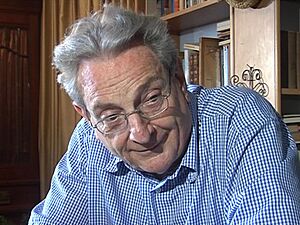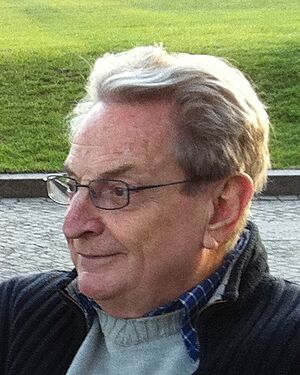Yehuda Elkana facts for kids
Quick facts for kids
Yehuda Elkana
|
|
|---|---|

Elkana in 2007
|
|
| President and Rector of Central European University |
|
| In office 1999–2009 |
|
| Preceded by | Josef Jarab |
| Succeeded by | John Shattuck |
| Personal details | |
| Born | 16 June 1934 Subotica, Vojvodina, Kingdom of Yugoslavia (now Serbia) |
| Died | 21 September 2012 (aged 78) Jerusalem, Israel |
| Spouse | Yehudit Elkana |
| Alma mater | Hebrew University, Brandeis University |
Yehuda Elkana (Hebrew: יהודה אלקנה; 16 June 1934 – 21 September 2012) was an important historian and philosopher of science. He also served as the president and rector of the Central European University in Budapest, Hungary.
Contents
About Yehuda Elkana
Early Life and Education
Yehuda Elkana was born as László Fröhlich in Yugoslavia in 1934. His family spoke Hungarian and was Jewish. In 1944, they moved to Szeged. That same year, Elkana and his parents were sent to a place called Auschwitz. Luckily, his family was moved to Austria to work on rebuilding cities.
In 1948, when he was 14, he moved to Israel. He lived in Kibbutz HaZore'a, a community farm. Because of health issues, he couldn't do physical work. The kibbutz helped him get a scholarship to a school in Tel Aviv.
Soon, Elkana decided he wanted to study philosophy and the history of science. In 1955, he began studying mathematics and physics at the Hebrew University of Jerusalem. He taught at a school while working on his master's degree. He earned his PhD from Brandeis University in 1968. His research was about how the idea of energy developed.
A Career in Academia
After getting his PhD, Elkana taught at Harvard University for a year. When he returned to the Hebrew University of Jerusalem, he became the head of the history and philosophy of science department. He also became the Director of the Van Leer Jerusalem Institute in 1968, a role he held until 1993.
He taught at many famous universities. He was a visiting scholar at All Souls College, Oxford, and worked on the Einstein Papers Project. He also directed the Cohn Institute for the History and Philosophy of Science and Ideas at Tel Aviv University.
In 1985, he started a special program for talented students at Tel Aviv University. He led this program until 1994. From 1995 to 1999, he was a professor at ETH Zurich in Switzerland. He was also a permanent fellow at the Institute for Advanced Study, Berlin.
Elkana was a member of the International Academy for the History of Science. He also helped start and edit a science journal called Science in Context. Later in his career, he began working on a global plan to improve university education. This led to the creation of the Curriculum Reform Forum.
Leading a University
In 1999, Yehuda Elkana became the president and rector of the Central European University (CEU). He took over from Josef Jarab. He was the third leader of the university in nine years. He stayed in this role until 2009, when John Shattuck took over.
During his time at CEU, Elkana made some important changes. He reorganized the environmental sciences department. He made sure there were fewer students per professor by reducing student numbers and hiring more teachers. By the end of his term, this department was very successful.
Under Elkana's leadership, five new departments were created at CEU. These included Philosophy, Mathematics, Sociology, Social Anthropology, and Public Policy. Fifteen new research centers were also started. CEU also received official recognition from a major US education group. It was also legally recognized as a Hungarian University. This allowed CEU to join many European Union research and education programs.
After he retired in 2009, Elkana was given the special title of President and Rector Emeritus.
Views on History and Memory
In 1988, Yehuda Elkana wrote an article where he discussed the role of the Holocaust in Israeli identity. He felt that focusing too much on past suffering could make people feel like eternal victims. He believed that the lessons from such terrible events should be universal. They should teach us to prevent similar things from happening to any group of people.
Elkana thought that a life philosophy based only on the Holocaust could lead to problems. He believed that while the world should remember the Holocaust, people in Israel should also learn to look forward. He felt that too much focus on these memories could be a threat to the country's future.
In 2005, Elkana gave a speech in Germany. He said he loved Israel and wanted it to continue to exist. However, he also warned against strong nationalist feelings that could harm the country's democratic nature. He believed that no state based on one religion could be fully democratic.
He explained that when he called for "the need to forget" in Israel, he meant forgetting the political use of the Holocaust. He felt that individuals should choose how they remember. But he also said that Germany must always publicly remember the Holocaust. He believed this chapter should never be closed for Germany.
Personal Life
Yehuda Elkana was married to Dr. Yehudit Elkana. They had four children. One of their children is Amos Elkana (born 1967), who is a composer and musician.
 | Stephanie Wilson |
 | Charles Bolden |
 | Ronald McNair |
 | Frederick D. Gregory |


